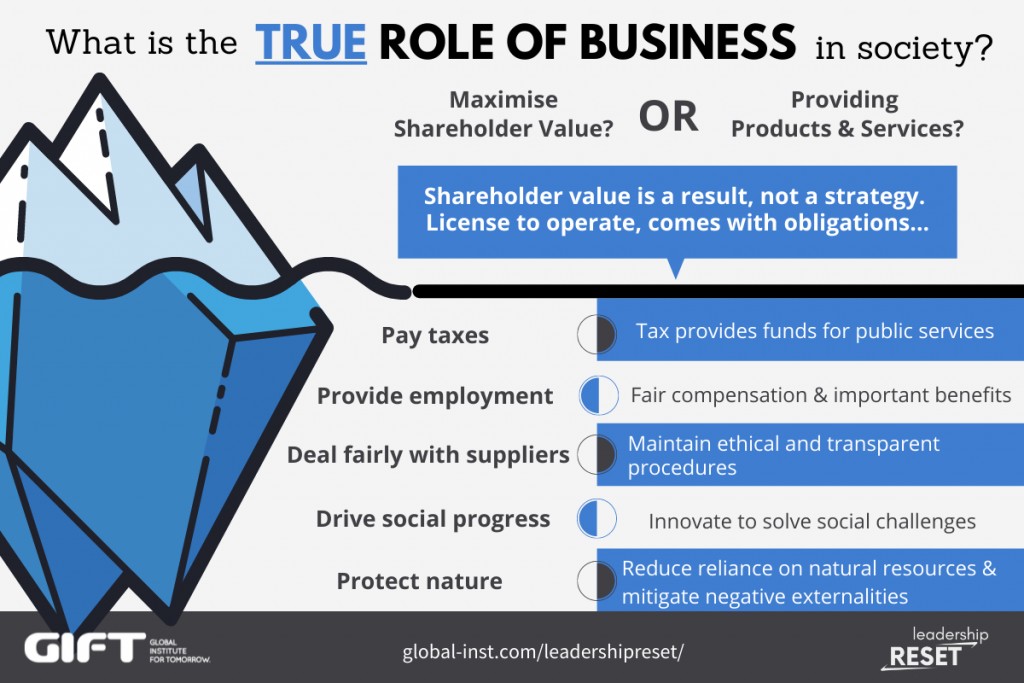Maximising Shareholder Value is a Result, not Strategy
Legendary General Electric CEO Jack Welch had met or beaten forecasters’ expectations 46 out of 48 straight quarters during his 20-year tenure in the company. However, 8 years into his retirement, he denounced the long-held view that a business’ sole purpose is to maximise shareholder value.
As this Forbes article points out ,the difference between managing expectations and managing business outcomes (via products and services) is that the former consists of shares and stock, while the latter is considered the ‘real market’. Yet the former is more valued, and how a leader chooses to manage an organisation (expectations market vs real market) has big impacts on the company, its employees and society. Stock-based compensation, versus real market metrics, changed the narrative on why business exists, confusing many in the process.
While profit ensures the viability of the enterprise, making bottom line your only KPI can blinker you from potential backlash or from more profitable opportunities in the long run.
“Innovate to Drive Social Progress”
It is almost impossible not to hear it at least once in every session at major conferences that business can innovate or drive new innovations.
While this may not be an obligation of a business, it is how business improves its processes for producing, selling or adding value. In the August 2019 Business Roundtable Statement, CEOs of the largest companies in US agreed that delivering value to all stakeholders as part of the "Purpose of a Corporation".
But what does this all mean for you? For innovation to be more than an empty slogan, you and your team need to start building the mental muscles for creativity to flow. Skills and behaviour such as conceptual thinking, curiosity, reflection and collaboration are key to unlocking your teams potential. Here are some examples of how addressing social gaps with innovative ideas have made businesses successful.
Paying Taxes to Fund Public Services
Business also supports a well-functioning government by paying tax to fund public services. Although paying tax is not its primary role,tax avoidance has nonetheless been called an abuse of human rights by the International Bar Association because it deprives poorer countries access to resources for healthcare, education and essential infrastructure like water and sanitation.
Taxes don't only serve the public but also help to provide enabling infrastructure for business to thrive.
Providing employment and fair compensation
Stakeholders such as employees rarely have any say in decision making, despite their indispensable role. Following the rise of algorithms, automation and artificial intelligence, all of which have penetrated deeper into mainstream operations, business are now changing the way they think about labour.
The ever-expanding supply chain in MNCs has put downward cost pressure on its production, which often creates problems for workers’ rights i.e., the right to a fair wage and benefits. Those that hide behind complex supply chains and continue to exploit their labour are now faced with increasing risk of worker strikes and PR nightmares.
Learn more about the discussions surrounding universal basic income:
Fair Dealings with Suppliers
Similar to employees, suppliers are an important stakeholder to ensure your business run smoothly. A strong and healthy supplier relationship is built on trust and transparency in your dealings, which includes, fair competition, good procurement processes as well as accurate terms and conditions. As supply chains become more complex, business leaders tend to reduce suppliers into mere stats and figures. Rather than seeing suppliers as cost to be minimised, treat them as partners to share your success with.
Protecting Nature
For centuries, businesses have enjoyed a free ride via externalities, by exploiting environmental resources. It is not in the nature of business to limit itself, which is why the regulatory role played by government is often viewed as the enemy of business. But it is the government that builds vital infrastructure like roads, water pipes, and electricity lines, and also supports education and health, as well as investing in core R&D, which are all critical for your company's survival. Therefore, rather than looking for loopholes, you as a business leader should prepare by interrogating your current business models, and core products and services as if they were to face strict regulatory restrictions, or navigate through another global shock such as the COVID-19 pandemic.




























